(完整)反义疑问句用法
(完整版)反意疑问句的用法归纳
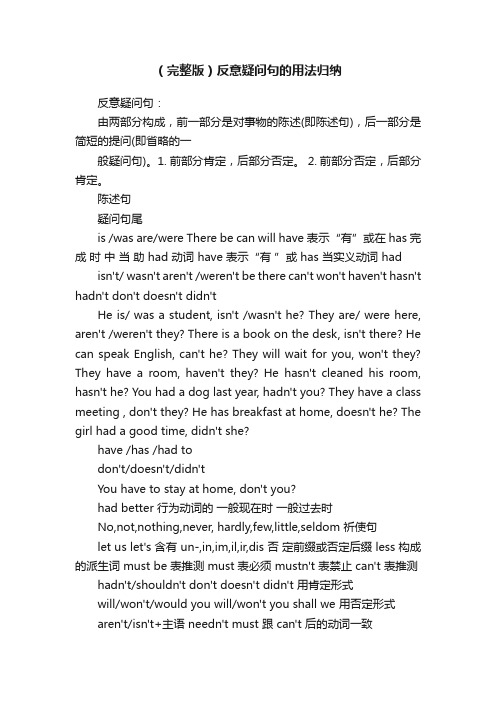
(完整版)反意疑问句的用法归纳反意疑问句:由两部分构成,前一部分是对事物的陈述(即陈述句),后一部分是简短的提问(即省略的一般疑问句)。
1. 前部分肯定,后部分否定。
2. 前部分否定,后部分肯定。
陈述句疑问句尾is /was are/were There be can will have 表示“有”或在 has 完成时中当助 had 动词 have 表示“有”或 has 当实义动词 had isn't/ wasn't aren't /weren't be there can't won't haven't hasn't hadn't don't doesn't didn'tHe is/ was a student, isn't /wasn't he? They are/ were here, aren't /weren't they? There is a book on the desk, isn't there? He can speak English, can't he? They will wait for you, won't they? They have a room, haven't they? He hasn't cleaned his room, hasn't he? You had a dog last year, hadn't you? They have a class meeting , don't they? He has breakfast at home, doesn't he? The girl had a good time, didn't she?have /has /had todon't/doesn't/didn'tYou have to stay at home, don't you?had better 行为动词的一般现在时一般过去时No,not,nothing,never, hardly,few,little,seldom 祈使句let us let's 含有 un-,in,im,il,ir,dis 否定前缀或否定后缀 less 构成的派生词 must be 表推测 must 表必须 mustn't 表禁止 can't 表推测hadn't/shouldn't don't doesn't didn't 用肯定形式will/won't/would you will/won't you shall we 用否定形式aren't/isn't+主语 needn't must 跟 can't 后的动词一致We'd better go now, hadn't/shouldn't we? They like playing football, don't they? He likes music, doesn't he? The woman bought a book, didn't she? He has hardly done his homework, has he? Please turn it on, will/won't/would you? Let us help him, will/won't you Let's have a rest, shall we? She dislikes it, doesn't she? You are unhappy, aren't you? You are hopeless, aren't you? He must be happy, isn't he ? You must do it today, needn't you? You mustn't talk like that, must you? He can't be a doctor, is he?I am 主从复合句 I think/believe/guess/ suppose+宾语从句并列句 used toaren't /ain't I; am I not I am your friend, aren't I一般跟主句一致He said she had been there, didn't he?动词和主语跟从句一 I think he'll come to help us, won't he? 致,用肯定还是否定 I don't think he is clever, is he? 根据主句来确定与邻近的分句一致Mary is here, but she was here just now, wasn't she?usedn't/didn'tHe used to be a teacher, usedn't/didn't he?5陈述句主语疑问句尾主语例句this, thatitThis is your brother, isn't it?These, thosetheyThese are not books, are they?oneone, heOne can't be always young, can one/he?something, anythingitNothing is serious, is it?everything, nothingEverything seems all right, doesn't it?everybody, everyoneEveryone knows this, don't they/doesn't he?somebody, someoneNobody likes to lose money, does he?anybody, anyonethey ,heNo one came , did they?nobody, no one,noneeither, neithereach ofthey ,heEach of the boys had an apple, didn't he /they?some(none) ofIt 或 they ,you None of the food was delicious, was it?Some of the men have come back, haven't they?or, and , neither…nor, either…or, both…and 复数代词Neither you nor I am wrong, are we? Both Tom and Jack came, didn't they?not only… but also not...but 等连接的并列主语不定式,动名词,从句或词组 the+ 形容词表示一类人 there 引起的句子it 复数代词 thereTo learn English well isn't easy, is it? Swimming is great fun,isn't it? The poor had no right to speak at that time, did they? There stands a house and a lot of trees, doesn't一、选择填空they? 6.--That's wrong, isn't it? -- ______1.Jim is a driver,_____?A. Yes, it is.B. Yes, it isn't.A. does heB. doesn't heC. is heD. isn't heC. No, it is.D. Yes, it was.2.You have a sports meeting every year,___? 7. Let's take a short rest, ______?A. have youB. do youA. do weB. aren't weC. haven't youD. don't youC. will youD. shall we3. He has never watched such an important8. Five-year-old children are too young to gomatch , _____ he?to school, ________ they?A. hasn'tB. hasC. isD. isn'tA. areB. aren'tC. wereD. have4.They have to work at once,______ they?9. Hundreds of people lost their lives in theA. haveB. haven'tC. doD. don'taccident,_______ they?5. She often feels tired,______ she?A. don'tB. didn'tC. doD. didA. doesn'tB. doesC. isD. isn't10.There isn't any bread on the table, ______?6A. isn't thereB. is thereC. has thereD. is it11. Mr King can not speak Chinese,____ he?A.doesn'tB. doesC. can'tD. can12. Lily didn't come to school, did she?____. She was ill in bed.A.No ,she didB. Yes , she did.C. No ,she didn't.D. Yes ,she didn't13.--She isn't a teacher, is she?--_____. She works in a hospital.A.No ,she isB. Yes , she is.C. No ,she isn't.D. Yes ,she isn't14.Lily looks like Lucy,_______?A. is LilyB. isn't sheC. does LillyD. doesn't she15.Tom often has lunch at school,_____?A. doesn't TomB. doesn't heC. does TomD. doesn't he16. Your family has no colour TV___it?A. hasn'tB. doesn'tC.isD. has17.You could hardly believe what he had said, _____ you?A. couldB. couldn'tC. canD. were18. --You don't smoke, do you?--______.A. Yes, I don'tB. No, I doC. No, I don'tD. Yes, I am.二、完成下列反意疑问句.1.You are late, ________ __________?2.He is on time,_________ _________?3.They were in the classroom just now,________ _________?4.She was ten years old last year_________________?5. They are going hiking next Sunday,________ _________?6.That cat is running up the tree.7.Ann is going to help me with my English8 There is some water in the bottle,___________________?9.There are many soldiers over there, _______ __________?10.He can skate, __________ ___________? 11.My parents can play chess,_____ ______? 12. They will work on the farm,________ _________? 13. My parents will visit my grandparents next Monday,________ _________? 14. They have written nine books since 1995,________ _________? 15, The woman has already found her son. ,________ _________? 16. They have three balls,_______ ______? 17. Jack has two sister,________ _______? 18.They have six classes every day,________ _________? 19.Tom has lunch at home,_____ _________?20.The students had a good time last Sunday,___________ ____________? 21. We have to finish it,______ ________? 22. The workers had to take the first bus, ________ _________? 23. You had better stay at home today, _________ __________? 24.We clean our classroom every day, ________ _________? 25. He watches TV on Saturday evening,________ _________? 26. The boys often play football on the playground,________ _________? 27.The singerswent to H.K yesterday, ________ _________? 28.They studied hard last year,________ _________? 29.They planted many trees last month,________ _________? 30.This pen is yours,_________ __________? 31.That was a wonderful film,______ _____?32.Everything is ready, ________ ________? 33.There is nothing wrong with the radio,___734.He did little homework yesterday, _______ __________?35.You'd like some coffee,______ ______? 36.Let's have a rest, _______ ____________? 37.Let us read the text, ________ ________?38.Don't read in bed, _________ _________? 39. Stop laughing,_______ __________? 40. He has to go there at eight,______ _____? 41.He has never been to Beijing, _____ ____? 42.She can hardly speak,_______ ________? 43.Few people know her here______ _____? 44.His mother was unhappy when she heard the news, _____ _______? 45.She dislikes watching football match____ ______? 46.He used to swim in the river,____ _____? 47.I think your brother is right, ____ ______?48. I don't think he will go there,____ _____?选择疑问句选择疑问句说话人对问题提出两个或两个以上的选项,让对方选择回答。
反意疑问句的用法归纳
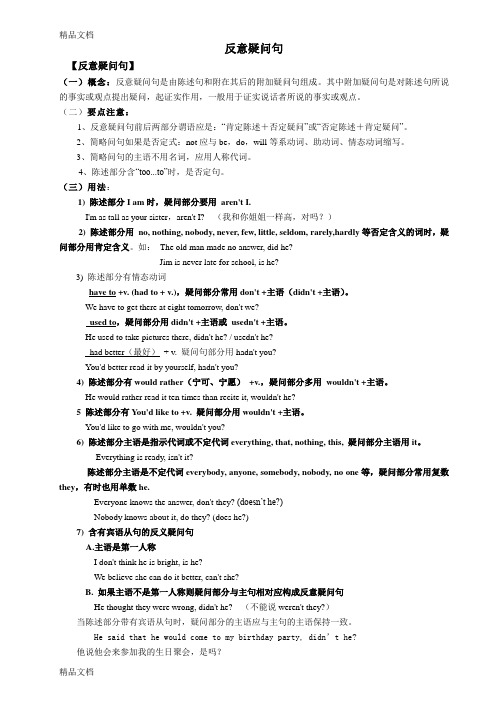
反意疑问句【反意疑问句】(一)概念:反意疑问句是由陈述句和附在其后的附加疑问句组成。
其中附加疑问句是对陈述句所说的事实或观点提出疑问,起证实作用,一般用于证实说话者所说的事实或观点。
(二)要点注意:1、反意疑问句前后两部分谓语应是:“肯定陈述+否定疑问”或“否定陈述+肯定疑问”。
2、简略问句如果是否定式:not应与be,do,will等系动词、助动词、情态动词缩写。
3、简略问句的主语不用名词,应用人称代词。
4、陈述部分含“too...to”时,是否定句。
(三)用法:1) 陈述部分I am时,疑问部分要用aren't I.I'm as tall as your sister,aren't I?(我和你姐姐一样高,对吗?)2) 陈述部分用no, nothing, nobody, never, few, little, seldom, rarely,hardly等否定含义的词时,疑问部分用肯定含义。
如:The old man made no answer, did he?Jim is never late for school, is he?3) 陈述部分有情态动词have to +v. (had to + v.),疑问部分常用don't +主语(didn't +主语)。
We have to get there at eight tomorrow, don't we?used to,疑问部分用didn't +主语或usedn't +主语。
He used to take pictures there, didn't he? / usedn't he?had better(最好)+ v. 疑问句部分用hadn't you?You'd better read it by yourself, hadn't you?4) 陈述部分有would rather(宁可、宁愿)+v.,疑问部分多用wouldn't +主语。
反义疑问句的用法归纳总结
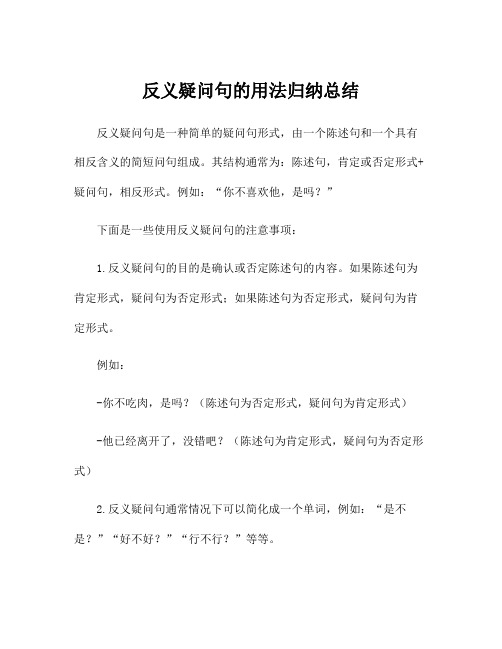
反义疑问句的用法归纳总结反义疑问句是一种简单的疑问句形式,由一个陈述句和一个具有相反含义的简短问句组成。
其结构通常为:陈述句,肯定或否定形式+疑问句,相反形式。
例如:“你不喜欢他,是吗?”
下面是一些使用反义疑问句的注意事项:
1.反义疑问句的目的是确认或否定陈述句的内容。
如果陈述句为肯定形式,疑问句为否定形式;如果陈述句为否定形式,疑问句为肯定形式。
例如:
-你不吃肉,是吗?(陈述句为否定形式,疑问句为肯定形式)-他已经离开了,没错吧?(陈述句为肯定形式,疑问句为否定形式)
2.反义疑问句通常情况下可以简化成一个单词,例如:“是不是?”“好不好?”“行不行?”等等。
3.反义疑问句通常用于口语中,用于询问对方的意见、确认事实
等等。
在正式的文书、学术论文中不适用。
4.如果说陈述句是用强调语气的话,则疑问句会反过来,即疑问
句用的是疑问语气。
例如:
-他真的赢了,是吧?(陈述句用了强调语气,则疑问句要用疑问
语气)
-你认真工作,对吗?(陈述句用了强调语气,则疑问句要用疑问
语气)
5.反义疑问句在不同的区域和地方使用方式可能会有所差异。
在
英国,人们经常在句子末尾加上“innit”,而在美国则较少使用该词。
6.反义疑问句的使用需要注意语气问题,不同的语气会对陈述句
的意义和疑问句的目的产生影响。
常见的语气有肯定语气、否定语气
和委婉语气等等。
反义疑问句用法(最新全)
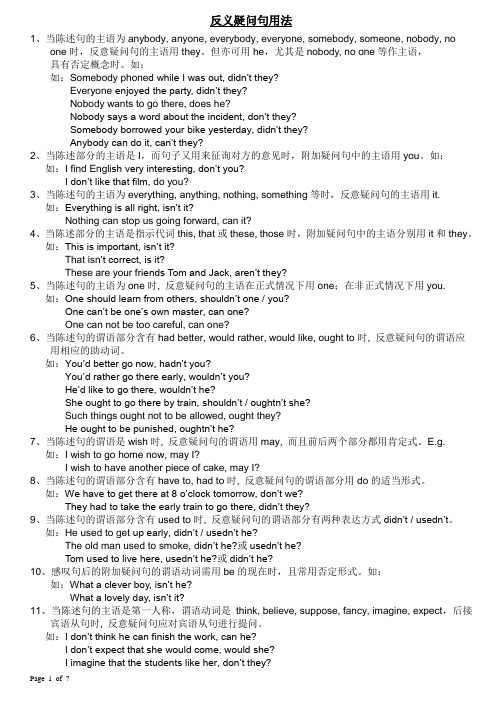
1、当陈述句的主语为anybody, anyone, everybody, everyone, somebody, someone, nobody, noone时,反意疑问句的主语用they。
但亦可用he,尤其是nobody, no one等作主语,具有否定概念时。
如:如:Somebody phone d while I was out, didn’t they?Everyone enjoyed the party, didn’t they?Nobody wants to go there, does he?Nobody says a word about the incident, don’t they?Somebody borrowed your bike yesterday, didn’t they?Anybody can do it, can’t they?2、当陈述部分的主语是I,而句子又用来征询对方的意见时,附加疑问句中的主语用you。
如:如:I find Engli sh very interesting, don’t you?I don’t like that film, do you?3、当陈述句的主语为everything, anything, nothing, something等时,反意疑问句的主语用it.如:Everything is all right, isn’t it?Nothing can stop us going forward, can it?4、当陈述部分的主语是指示代词this, that或these, those时,附加疑问句中的主语分别用it和they。
如:This is important, isn’t it?That isn’t correct, is it?These are your fri ends Tom and Jack, aren’t they?5、当陈述句的主语为one时, 反意疑问句的主语在正式情况下用one;在非正式情况下用you.如:One should learn from others, shouldn’t one / you?One can’t be one’s own master, can one?One can not be too careful, can one?6、当陈述句的谓语部分含有had better, would rather, would like, ought to时, 反意疑问句的谓语应用相应的助动词。
反义疑问句用法(最新全)

反义疑问句用法(最新全)1、当陈述句的主语为anybody, anyone, everybody, everyone, somebody, someone, nobody, noone时,反意疑问句的主语用they。
但亦可用he,尤其是nobody, no one等作主语,具有否定概念时。
如:如:Somebody phone d while I was out, didn’t they?Everyone enjoyed the party, didn’t they?Nobody wants to go there, does he?Nobody says a word about the incident, don’t they?Somebody borrowed your bike yesterday, didn’t they?Anybody can do it, can’t they?2、当陈述部分的主语是I,而句子又用来征询对方的意见时,附加疑问句中的主语用you。
如:如:I find Engli sh very interesting, don’t you?I don’t li ke that film, do you?3、当陈述句的主语为everything, anything, nothing, something等时,反意疑问句的主语用it.如:Everything is all right, isn’t it?Nothing can stop us going forward, can it?4、当陈述部分的主语是指示代词this, that或these, those时,附加疑问句中的主语分别用it和they。
如:This is important, isn’t it?That isn’t correct, is it?These are your fri ends Tom and Jack, aren’t they?5、当陈述句的主语为one时, 反意疑问句的主语在正式情况下用one;在非正式情况下用you.如:One should learn from others, shouldn’t one / you?One can’t be one’s own master, can one?One can not be too careful, can one?6、当陈述句的谓语部分含有had better, would rather, would like, ought to时, 反意疑问句的谓语应用相应的助动词。
反义疑问句的用法归纳
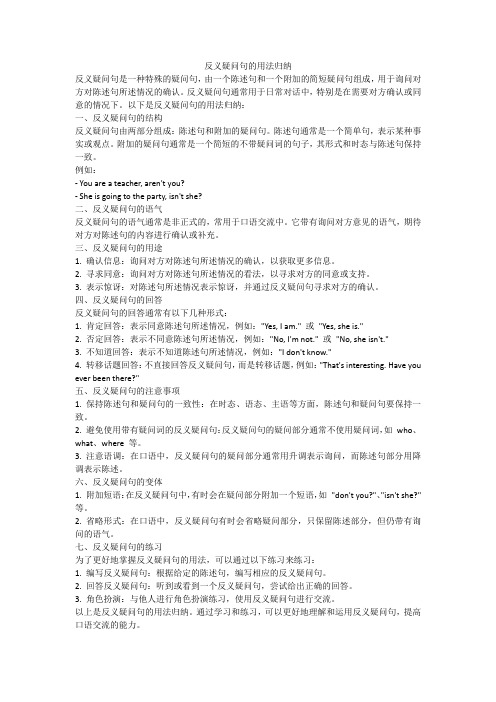
反义疑问句的用法归纳反义疑问句是一种特殊的疑问句,由一个陈述句和一个附加的简短疑问句组成,用于询问对方对陈述句所述情况的确认。
反义疑问句通常用于日常对话中,特别是在需要对方确认或同意的情况下。
以下是反义疑问句的用法归纳:一、反义疑问句的结构反义疑问句由两部分组成:陈述句和附加的疑问句。
陈述句通常是一个简单句,表示某种事实或观点。
附加的疑问句通常是一个简短的不带疑问词的句子,其形式和时态与陈述句保持一致。
例如:- You are a teacher, aren't you?- She is going to the party, isn't she?二、反义疑问句的语气反义疑问句的语气通常是非正式的,常用于口语交流中。
它带有询问对方意见的语气,期待对方对陈述句的内容进行确认或补充。
三、反义疑问句的用途1. 确认信息:询问对方对陈述句所述情况的确认,以获取更多信息。
2. 寻求同意:询问对方对陈述句所述情况的看法,以寻求对方的同意或支持。
3. 表示惊讶:对陈述句所述情况表示惊讶,并通过反义疑问句寻求对方的确认。
四、反义疑问句的回答反义疑问句的回答通常有以下几种形式:1. 肯定回答:表示同意陈述句所述情况,例如:"Yes, I am." 或"Yes, she is."2. 否定回答:表示不同意陈述句所述情况,例如:"No, I'm not." 或"No, she isn't."3. 不知道回答:表示不知道陈述句所述情况,例如:"I don't know."4. 转移话题回答:不直接回答反义疑问句,而是转移话题,例如:"That's interesting. Have you ever been there?"五、反义疑问句的注意事项1. 保持陈述句和疑问句的一致性:在时态、语态、主语等方面,陈述句和疑问句要保持一致。
(完整版)反意疑问句用法完全归纳
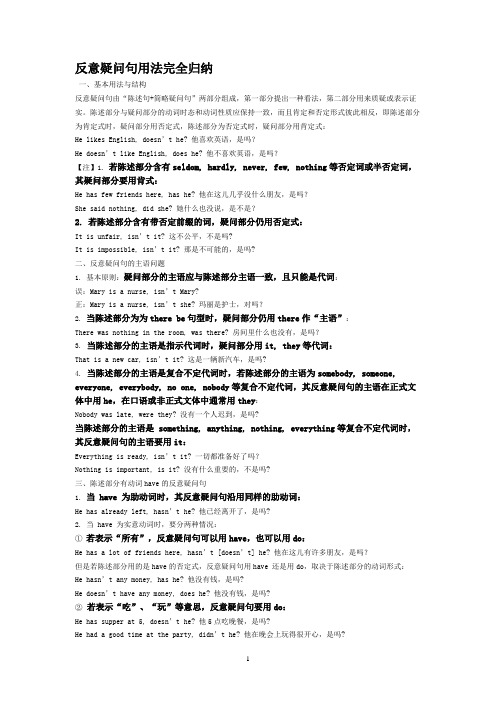
反意疑问句用法完全归纳一、基本用法与结构反意疑问句由“陈述句+简略疑问句”两部分组成,第一部分提出一种看法,第二部分用来质疑或表示证实。
陈述部分与疑问部分的动词时态和动词性质应保持一致,而且肯定和否定形式彼此相反,即陈述部分为肯定式时,疑问部分用否定式,陈述部分为否定式时,疑问部分用肯定式:He likes English, doesn’t he? 他喜欢英语,是吗?He doesn’t like English, does he? 他不喜欢英语,是吗?【注】1. 若陈述部分含有seldom, hardly, never, few, nothing等否定词或半否定词,其疑问部分要用肯式:He has few friends here, has he? 他在这儿几乎没什么朋友,是吗?She said nothing, did she? 她什么也没说,是不是?2. 若陈述部分含有带否定前缀的词,疑问部分仍用否定式:It is unfair, isn’t it? 这不公平,不是吗?It is impossible, isn’t it? 那是不可能的,是吗?二、反意疑问句的主语问题1. 基本原则:疑问部分的主语应与陈述部分主语一致,且只能是代词:误:Mary is a nurse, isn’t Mary?正:Mary is a nurse, isn’t she? 玛丽是护士,对吗?2. 当陈述部分为为there be句型时,疑问部分仍用there作“主语”:There was nothing in the room, was there? 房间里什么也没有,是吗?3.当陈述部分的主语是指示代词时,疑问部分用it, they等代词:That is a new car, isn’t it? 这是一辆新汽车,是吗?4.当陈述部分的主语是复合不定代词时,若陈述部分的主语为somebody, someone, everyone, everybody, no one, nobody等复合不定代词,其反意疑问句的主语在正式文体中用he,在口语或非正式文体中通常用they:Nobody was late, were they? 没有一个人迟到,是吗?当陈述部分的主语是 something, anything, nothing, everything等复合不定代词时,其反意疑问句的主语要用it:Everything is ready, isn’t it? 一切都准备好了吗?Nothing is important, is it? 没有什么重要的,不是吗?三、陈述部分有动词have的反意疑问句1. 当 have 为助动词时,其反意疑问句沿用同样的助动词:He has already left, hasn’t he? 他已经离开了,是吗?2. 当 have 为实意动词时,要分两种情况:①若表示“所有”,反意疑问句可以用have,也可以用do:He has a lot of fri ends here, hasn’t [doesn’t] he? 他在这儿有许多朋友,是吗?但是若陈述部分用的是have的否定式,反意疑问句用have 还是用do,取决于陈述部分的动词形式:He hasn’t any money, has he? 他没有钱,是吗?He doesn’t have any money, does he? 他没有钱,是吗?②若表示“吃”、“玩”等意思,反意疑问句要用do:He has supper at 5, doesn’t he? 他5点吃晚餐,是吗?He had a good time at the party, didn’t he? 他在晚会上玩得很开心,是吗?3. 当用于have to时,通常也有两种可能:若表示经常性的行为,则多用加助动词do的形式;若表示特定的行为,则多用have:He often has to get up early, doesn’t he? 他经常要早起,是吗?He has to go to bed late tonight, hasn’t he? 他今晚要迟睡,是吗?四、含情态动词的反意疑问句1. 基本原则:在通常情况下,当陈述部分含有情态动词时,疑问部分会重复前面同样的情态动词:He can speak English, can’t he?他会说英语,是吗?We shouldn’t go, should we? 我们不应该去,对不对?2. 当陈述部分含有must时,要分两种情况:①若must表示“必须”或“有必要”,疑问部分用mustn’t 或needn’t:You must leave at once, mustn’t [needn’t] you? 你必须(有必要)马上离开,是吗?但是若陈述部分有mustn’t表示禁止,疑问部分要must:You mustn’t laugh, must you? 你不准笑,知道吗?②若must表示推测,疑问部分不能用must,而应根据must后的动词结构采用相应的动词形式:He must be tired, isn’t he? 他一定累了,是吗?五、陈述部分为祈使句的反意疑问句1. 基本原则:若陈述部分为祈使句,疑问部分通常用will you:Please help us, will you? 请帮帮我们,好吗?Come with us, will you? 同我们一起去,好吗?Don’t forget to post the letter, will you? 请别忘了寄信。
最全反意疑问句用法(精选5篇)
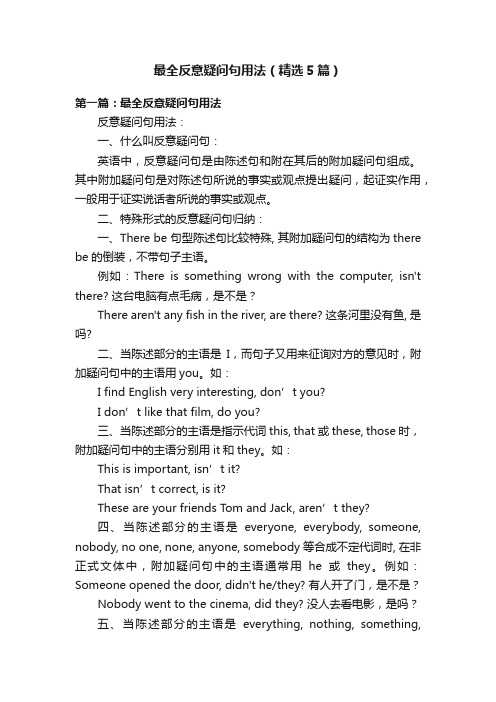
最全反意疑问句用法(精选5篇)第一篇:最全反意疑问句用法反意疑问句用法:一、什么叫反意疑问句:英语中,反意疑问句是由陈述句和附在其后的附加疑问句组成。
其中附加疑问句是对陈述句所说的事实或观点提出疑问,起证实作用,一般用于证实说话者所说的事实或观点。
二、特殊形式的反意疑问句归纳:一、There be 句型陈述句比较特殊, 其附加疑问句的结构为there be的倒装,不带句子主语。
例如:There is something wrong with the computer, isn't there? 这台电脑有点毛病,是不是?There aren't any fish in the river, are there? 这条河里没有鱼, 是吗?二、当陈述部分的主语是I,而句子又用来征询对方的意见时,附加疑问句中的主语用you。
如:I find English very interesting, don’t you?I don’t like that fil m, do you?三、当陈述部分的主语是指示代词this, that或these, those时,附加疑问句中的主语分别用it和they。
如:This is important, isn’t it?That isn’t correct, is it?These are your friends Tom and Jack, aren’t they?四、当陈述部分的主语是everyone, everybody, someone, nobody, no one, none, anyone, somebody等合成不定代词时, 在非正式文体中,附加疑问句中的主语通常用he或they。
例如:Someone opened the door, didn't he/they? 有人开了门,是不是?Nobody went to the cinema, did they? 没人去看电影,是吗?五、当陈述部分的主语是everything, nothing, something,anything等合成词,附加疑问句中的主语用it。
- 1、下载文档前请自行甄别文档内容的完整性,平台不提供额外的编辑、内容补充、找答案等附加服务。
- 2、"仅部分预览"的文档,不可在线预览部分如存在完整性等问题,可反馈申请退款(可完整预览的文档不适用该条件!)。
- 3、如文档侵犯您的权益,请联系客服反馈,我们会尽快为您处理(人工客服工作时间:9:00-18:30)。
(完整)反义疑问句用法编辑整理:尊敬的读者朋友们:这里是精品文档编辑中心,本文档内容是由我和我的同事精心编辑整理后发布的,发布之前我们对文中内容进行仔细校对,但是难免会有疏漏的地方,但是任然希望((完整)反义疑问句用法)的内容能够给您的工作和学习带来便利。
同时也真诚的希望收到您的建议和反馈,这将是我们进步的源泉,前进的动力。
本文可编辑可修改,如果觉得对您有帮助请收藏以便随时查阅,最后祝您生活愉快业绩进步,以下为(完整)反义疑问句用法的全部内容。
1)当陈述句的主语为anybody, anyone, everybody, everyone, somebody,someone, nobody, no one, these, those时,反意疑问句的主语用they。
如:everybody knows what I said, don’t they?Nobody says a word about the incident,don’t they?Somebody borrowed your bike yesterday, didn’t they?Anybody can do it,can’t they?2)当陈述句的主语为this, that, everything, anything, nothing, something 等时,反意疑问句的主语用it。
如:Everything is all right, isn't it?Nothing can stop us going forward, can it?3)当陈述句的主语为one时,反意疑问句的主语在正式情况下用one;在非正式情况下用you.如:One should learn from others,shouldn’t one / you?One can’t be one’s own master, can one?One can not be too careful, can one?4)当陈述句的谓语部分含有had better, would rather, would like, ought to 时,反意疑问句的谓语应用相应的助动词。
如:You’d better go now, hadn't you?You’d rather go there early,wouldn’t you?He'd like to go there, wouldn't he?She ought to go there by train, shouldn’t / oughtn’t she?Such things ought not to be allowed, ought they?He ought to be punished, oughtn’t he?5)当陈述句的谓语是wish时, 反意疑问句的谓语用may, 而且前后两个部分都用肯定式。
如:I wish to go home now, may I?I wish to have another piece of cake, may I?6)当陈述句的谓语部分含有have to, had to时,反意疑问句的谓语部分用do的适当形式。
如:We have to get there at 8 o’clock tomorrow, don’t we?They had to take the early train to go there, didn’t they?7)当陈述句的谓语部分含有used to时, 反意疑问句的谓语部分有两种表达方式didn’t/ usedn’t。
如:He used to get up early,didn’t / usedn’t he?8)当陈述句的主语是第一人称,谓语动词是 think, believe, suppose, fancy, imagine, expect,后接宾语从句时, 反意疑问句应对宾语从句进行提问。
如:I don't think he can finish the work, can he?I don’t expect that she would come, would she?I imagine that the students like her, don't they?I don't believe she knows it, does she?9)当陈述句的主语是第二,第三人称,谓语动词是 think, believe, suppose, fancy, imagine, expect后接宾语从句时,反意疑问句应对主句进行提问。
如:Mary thinks you will come to the meeting, doesn’t she?You don’t t hink English is important, do you?You think she is a good teacher, don’t you?Your brother thinks that you can do the job well,doesn’t he?10)如果陈述句中出现了表示否定意义的词few, little, never, hardly,seldom, nobody, rarely, scarcely时,反意疑问句的谓语用肯定式.如:He has few good reasons for staying, has he? She hardly writes to you,does she? He seldom goes to the cinema, does he? There is little water in the bottle, is there?11)祈使句的各种反意疑问句:a). Let’s …, shall we? E。
g。
Let’s go to the film, shall we? b). Let us … , will yo u? E.g. Let us go to the park, will you?c)。
Let me … , may I / will you / OK / all right?如:Let me go there alone, may I? / will you?If you want help—money or anything, let me know, will you?d)。
在否定的祈使句的后面,只能用will you?如:Don't tell anyone, will you?e)。
表示“请求” 意思的祈使句,反意疑问句用will you?如:Pass me the dictionary, will you? Stop that noise, will you?f)。
表示“邀请”,“劝诱” 意思的祈使句,反意疑问句用won’t you?如:Join us in the singing,won’t you?12. 陈述句中谓语动词是must + have + 动词的过去分词时,如果强调对过去情况的推测, 依据是(句中有过去的时间状语),反意疑问句根据动词用didn’t / wasn’t / weren’t +主语。
如:You must have read the story last term,didn’t you?He must have met her yesterday,didn’t he?13. 陈述句中谓语动词是must + have + 动词的过去分词时,如果只强调动作的完成,反意疑问句用haven’t / hasn’t +主语.如:She must have arrived t here, hasn’t she?You must have seen the film, haven't you?14)陈述句中谓语动词是must + 动词原形的情况:如:You must see the doctor, needn't you?You mustn’t do that again, must you?The food must be nice, isn't it?15)当陈述句的主语为each时,反意疑问句的主语用he.如:Each has his strong points, hasn’t he? / doesn’t he?16)当陈述句的主语为each of us, each of you, each of them时, 反意疑问句的主语用we, you, they。
如:Each of us has been here,haven’t we?Each of them has an English dictionary,haven’t they?17. 并列句的反意疑问句谓语的时态,要求和后一个句子的时态保持一致.如:It must have rained last night, for the ground is wet, isn’t it?Tom has been writing letters all afternoon,but she hasn’t finish now,hasn’t she?We must start at once or we can’t get there on time, can we?He is a teacher but his wife isn't a teacher, is she?18。
带有定语从句,同位语从句,状语从句,宾语从句的复合句,反意疑问句与主句在时态上保持一致。
如:She is not so stupid as she looks, is she? Lucy dreamed that she was in the moon, didn’t she?19。
陈述句主语为such时,反意疑问句的主语单数用it,复数用they。
如:Such is his trick, isn’t it? Such are your excuses, aren't they?20。
当陈述句的主语为each of … 结构时,反意疑问句的主语用he ,she, it 强调个体, 用we, you, they 强调全体。
如:Each of these novels is to be discussed this term,isn’t it?Each of us have got the prize,haven’t we?21。
当陈述句是I am … 结构时,反意疑问句用aren’t I.如:I am right,aren’t I? I am late,aren’t I?22.如果陈述句中的否定式仅仅是带有否定的词缀,反意疑问句仍用否定.如:He is unfit for his job, isn’t he?That’s unfair, isn’t it?23。
